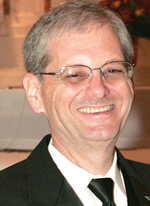August 29, 2023
Mizzou Engineering’s Jim Keller has been invited to give a distinguished talk at an international conference celebrating the contributions of John von Neumann, considered one of the greatest minds of the 20th century.

During his career, von Neumann established the architecture behind modern computers. He was a pioneer in quantum mechanics and physics. He introduced the concept of “open source,” defending public access to technological advancements. And, while not mentioned in the blockbuster movie, he developed the mechanism that made Robert Oppenheimer’s atomic bomb work.
“He was a great mathematician,” said Keller, Curators’ Distinguished Professor Emeritus of Electrical Engineering and Computer Science. “He did a lot of work in pure mathematics that had a wide range of applications. The computers we use are based on the von Neumann architecture, the idea of a stored program.”
Von Neumann is often referred to as one of the fathers of artificial intelligence (AI), even pre-dating Alan Turing, whose famous test set a standard for evaluating a machine’s ability to act human. Keller contends that von Neumann was more associated with computational intelligence, although he admits lines between the two fields have become blurred.
“That’s going to be the focus of what I talk about,” Keller said. “I actually think von Neumann had a much closer intersection with computational intelligence than classical artificial intelligence. He had thoughts on neural networks and the idea of evolutional computation — machines that reproduce.”
Coming out of the famous 1956 Dartmouth Workshop, AI uses propositions made up of discrete symbols to draw logical conclusions as to whether something is true or false. While probability can be accounted for, there’s little wiggle room outside of “true” and “false” answers. On the other hand, computational intelligence uses a range of numbers to allow for more variation.
Keller is a pioneer in that “fuzzy logic,” a mathematical framework that deals with degrees of truth and allows for the representation of uncertain information.
“Von Neumann was worried about uncertainty,” Keller said. “He understood that precise logic doesn’t work in real life. He studied probability using thermal dynamics as his model before fuzzy sets were around, but he understood that language is not precise. You can’t use precise logic to encapsulate all human knowledge and get a generally artificially intelligent machine.”
Today, most people lump computational intelligence and AI — along with machine learning and deep learning — together. Many, for instance, describe large language models such as ChatGPT as artificial intelligence even though Keller points out they’re actually deep networks under the umbrella of computational intelligence.
“But I don’t think there’s a clear distinction anymore,” said Keller, president of the Computational Intelligence Society within IEEE. “And that doesn’t bother me. What is computational intelligence versus artificial intelligence, and should we worry about it? I say no.”
Keller has been familiar with von Neumann’s work since graduate school. He recalls reading a math book written by von Neumann in both German and English, not only to study calculations but also to test his ability to read and understand math in German.
“I would not have imagined I’d be giving a talk in his honor,” Keller said. “This conference will bring together leading experts in the fields of mathematics, computer science, quantum physics and game theory to discuss his legacy and contributions. Von Neumann was just a great thinker in so many areas.”
The von Neumann 120 Scientific Conference at Hungarian Academy of Sciences in Budapest is Sept. 14.